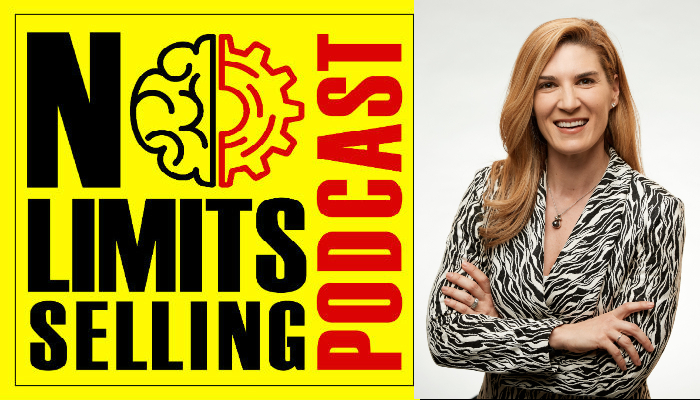Ragan Grossman on Selling Luxury
On Episode 116 of The No Limits Selling Podcast, we have Ragan Grossman, a Luxury Sales Consultant & Trainer. Ragan began her sales career in 2005 with Four Seasons Hotel & Resorts. She then worked for the legendary Little Nell Hotel in Aspen Colorado where she helped produce nationally recognized events like the Food & Wine Festival as well as the X Games.
Ragan returned to Four Seasons in corporate sales where she covered multiple geographic territories, developed training programs for new hires, and was part of a transition team that assisted in rebranding new hotels added to the Four Seasons portfolio.
In 2016, Marriott hired Ragan as the Director of Sales at the Phoenician Resort in Scottsdale Arizona due to her luxury background. She led the department of thirteen through not only the Starwood/Marriott merger, but also through a complete, two year, $120M renovation. Ragan now helps train sellers across all industries, and speaks about how to effectively navigate the corporate culture.

Contact Ragan:
[EDITOR’S NOTE: This podcast is sponsored by No Limits Selling. It is a fun, fast-paced podcast that delivers hard-fought business advice that you can implement today to improve your sales and performance]
Interested In Our Real Estate Coaching Services? Explore Our Website: Link
Feeling Not Well Today? You Can Use Our Mindset Boosters App To amp Up Your Mood: Link
Find us on Social Media:
LinkedIn | Facebook community | Instagram
Like what do you listen to? Subscribe to our podcast!
Ready to become fearless? We can help you become fearless in 60 days so you accomplish more in your career Schedule A 15 min Call with Umar
Summary
Introduction and Welcome
The podcast begins with the host, Umar Hameed, welcoming the listeners to the No Limits Selling Podcast. He introduces the guest, Ragan Grossman, who is an expert at selling luxury. Ragan thanks Umar for having her on the show.
Discussing Sales and Luxury
Umar brings up a client, Smyth Jewelers, and discusses how new salespeople often have hangups around money. He asks Ragan about her experiences training people to sell luxury items. Ragan explains that one of the first things you have to do is get the salespeople to see the value in what they are selling. She shares her experience of starting in the luxury hotel world where she had to sell a Coke for $8.
The Importance of Consistency
Ragan emphasizes the importance of consistency in selling luxury items. She explains that high-end companies have a reputation for consistently superior products or services. It's important for salespeople to also be consistently superior. She shares that it became quite easy to make sales once she understood and believed in the value of the products she was selling.
Selling a Luxury Experience
Umar and Ragan discuss the difference between selling a product and selling an experience. They talk about how the level of service, amenities, and overall experience can justify a higher price for luxury items. Ragan shares her experience of selling luxury hotel rooms and how she had to explain the value of the elevated cost to customers.
Overcoming Challenges
Ragan shares a story about a challenging request from a client and how she managed to fulfill it by thinking creatively and figuring out how to get to a "yes". She explains that part of selling luxury is about figuring out how to make the client's wishes happen, no matter how astronomical they might seem.
Conclusion
In the podcast "Ragan Grossman Video Interview Audio," Ragan Grossman, an expert in selling luxury, shares her insights and experiences with host Umar Hameed. The discussion revolves around the nuances of selling luxury items and services, the importance of understanding and believing in the value of what you're selling, and the need for consistency in delivering superior quality. Ragan emphasizes the difference between selling a product and selling an experience, highlighting that the level of service, amenities, and overall experience can justify a higher price for luxury items.
She also shares a personal story about a challenging client request, illustrating the importance of creative problem-solving and determination in achieving a positive outcome. The podcast concludes with an appreciation for Ragan's transparency and the valuable lessons she shared from her experiences.
Questions & Answers
What is this podcast about?
Who is Ragan Grossman?
What does Ragan Grossman say about selling luxury items?
What is the importance of consistency in selling luxury items?
What is the difference between selling a product and selling an experience, according to Ragan Grossman?
How does Ragan Grossman handle challenging client requests?
Don’t miss this opportunity to transform your real estate career with one-on-one coaching. As an experienced real estate coach, I, Umar Hameed, am dedicated to helping you unlock your full potential and achieve your real estate goals. To learn more about who am I and my clients ↓
If you’re ready to take the next step, book an appointment with me today and begin your journey toward success in the real estate industry.
